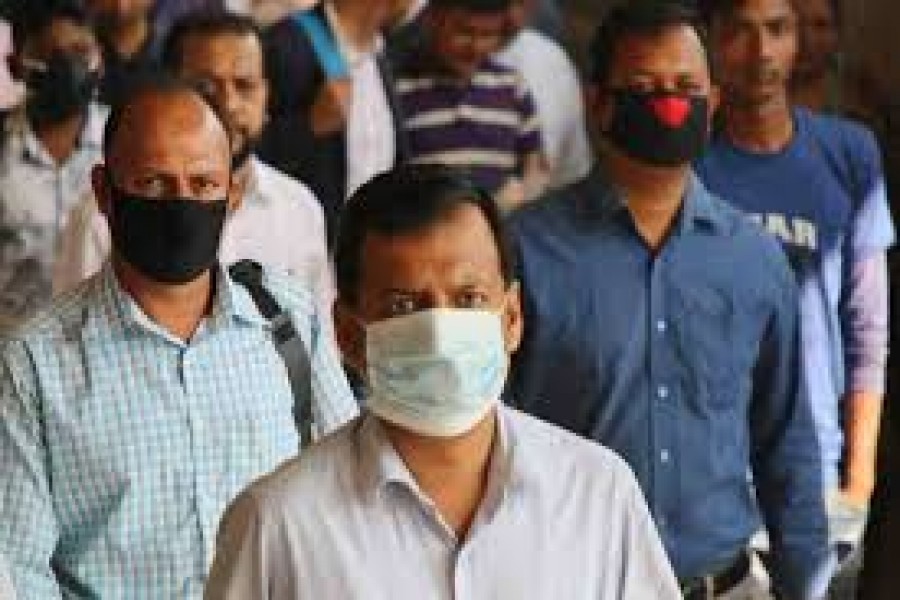Pandemics like the one caused by novel coronavirus pose significant ethical challenges to preserving public health by states, as the state has a responsibility to promote and protect health of its citizens. Public health officials have numerous tools as well as responses, including legally mandated ones and those based on past experiences, which are applied to contain and mitigate spread of pandemic diseases. These measures include: 'isolation' or barring movement of infected people; 'quarantine' or restricting movement of otherwise healthy persons exposed to an infectious disease; travel advisories and restrictions; and culling or destroying livestock to prevent 'animal to human' transmission of disease.
These steps may be executed on a voluntary basis or may be implemented through legally enforceable means. In Bangladesh, 'The Communicable Diseases (Prevention, Control and Eradication) Act, 2018' and the 'Disaster Management Act, 2012' provide the legal framework for dealing with pandemics like Covid-19.
As pandemic diseases transcend national boundaries, rapid and effective responses require not only localised efforts at the national level, but also international collaborations for mutual support. Framed by the World Health Organization (WHO), the International Health Regulations (IHR) is a legal instrument that is binding on its 196 member states.
Ethical frameworks for pandemic responses have also been developed that attempt to guide the planning and decision-making processes. Although there is no single ethical framework backed by a consensus, large-scale agreement exists on a number of values that need to be considered by decision makers while devising strategies and measures for tackling pandemics. These frameworks identify, spell out and contextualise the key ethical values and principles that should be taken into account. Some of these are substantive, while others are procedural ones.
One such framework was devised by the Joint Centre for Bioethics Pandemic Influenza Working Group of the University of Toronto, Canada (2005) [cited by Mastroanni, Kahn and Kass, 2019], which deserves to be discussed here. This framework identified 10 substantive values and five procedural ones. The substantive values were: individual liberty, protection of the public, proportionality, privacy, duty to provide care, reciprocity, equity, trust, solidarity, and stewardship; and the procedural values were: reasonableness, openness and transparency, inclusivity, responsiveness, and accountability.
Restrictions to individual freedoms may become obligatory during a pandemic for protecting the public from harm. But these restrictions should be of essential nature, be proportional, and clearly relevant. The restrictions should be applied in an equitable manner by employing least restrictive modes. Although public health authorities and healthcare bodies may be forced to adopt measures that impinge on liberty, the policy makers should fully weigh the necessity for compliance, provide rationale for the measures in order to encourage compliance, and establish a mechanism for proper review of decisions.
Proportionality entails imposing restrictions in such a manner that they do not exceed what is realistically required to deal with the actual level of risks and the genuine needs of a vulnerable community. But although individuals usually have a right to privacy in matters of healthcare, it may become necessary to override this right during public health emergencies in order to protect the general public from serious harm.
Healthcare professionals are ethically duty-bound to provide care and respond to sufferings of their sick patients. But they also have the right to weigh the demands of their roles against other competing obligations like their own health and that of their family members. Besides, healthcare workers, patients and their families are likely to face substantial challenges with regard to allocated resources, scope for practice, professional liability and conditions at the workplace. Therefore, the value of reciprocity demands that authorities extend support to these classes of people who have to bear a disproportionate burden while protecting public good. Measures should be taken by policy-makers for minimising this burden.
All patients also have equal claims to receiving healthcare they require under normal circumstances. Difficult decisions have to be made during a crisis on the services that are to be maintained and the ones that should be deferred. This may curb not only elective surgeries, but also the provision of emergency or essential services depending on the severity of the calamity. Trust is another essential ingredient in the relationship between the authorities, the physicians and patients. Policy makers have to tackle the challenge of retaining trust of stakeholders by upholding values like transparency while implementing control measures.
A pandemic necessitates a new vision of global solidarity among nations, as it challenges conventional concepts of national sovereignty, security and territoriality. Solidarity within and among healthcare institutions is also required for dealing with it. A collaborative approach is therefore required globally by shelving traditional values of territoriality or self-interest among healthcare professionals and institutions.
The 10th substantive value is 'stewardship'. The notions of trust, ethical behaviour and good decision-making are ingrained in this concept that should be kept in mind by those entrusted with governance roles. The decisions related to setting priorities and allocating resources should yield best possible patient-cum-public-health outcomes during a pandemic.
As for procedural values, decisions should be based on reason; the decision-making process should be open and transparent, inclusive-cum-responsive; and the decision-makers should be accountable both for their actions and inactions.
Dr. Helal Uddin Ahmed is a retired Additional Secretary and former Editor of Bangladesh Quarterly.


